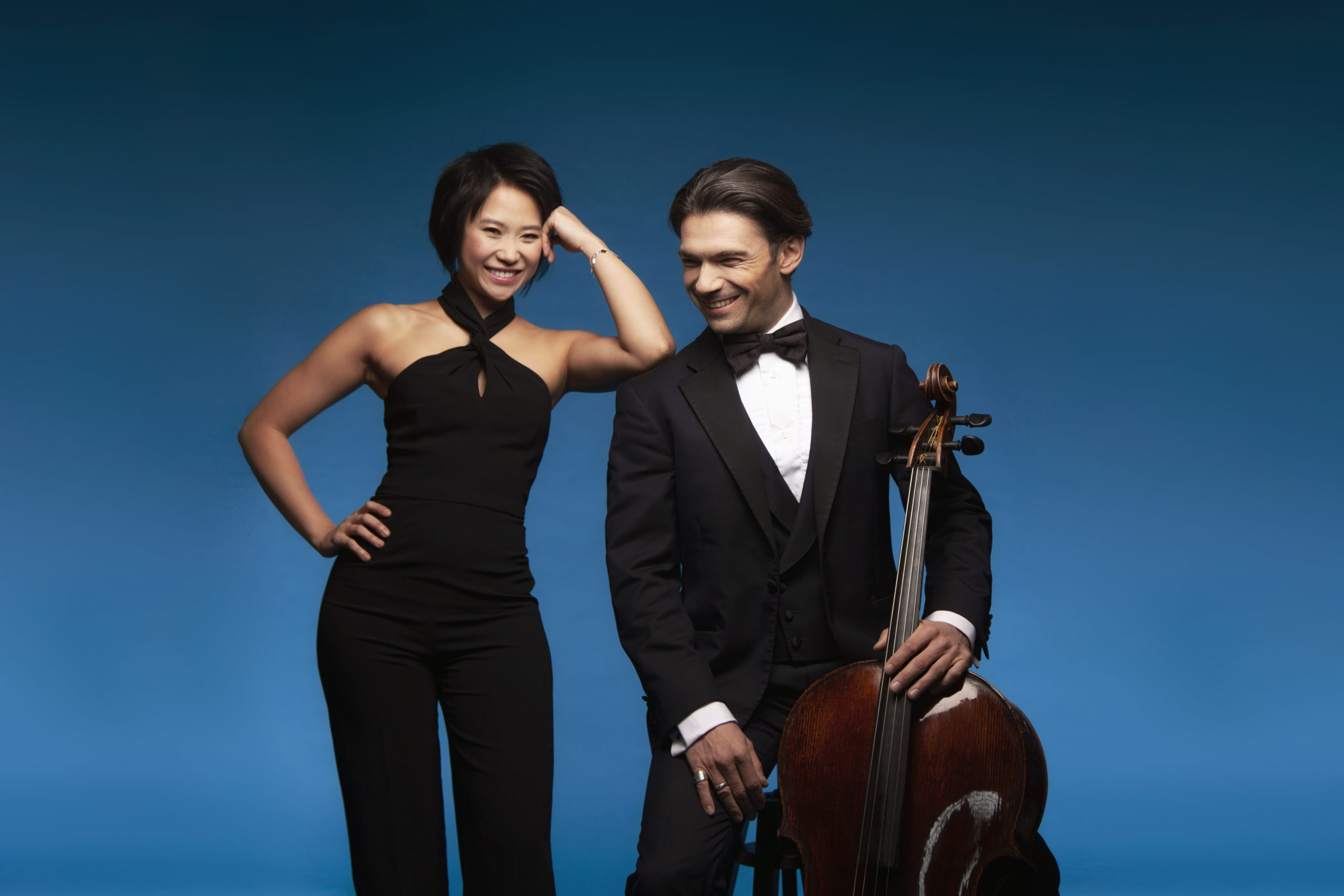
Photo: Michael Sharkey © Parlophone Records Ltd.
It’s one thing to hear an album by two widely admired artists; it’s quite another to have been present during its recording.
Such was the case with Franck-Chopin (Warner Classics) from pianist Yuja Wang and cellist Gautier Capuçon. Recorded at Koerner Hall in Toronto this past April at the very end of a busy spring recital tour, the album features two works by Chopin (Sonata in A Major and Polonaise brillante in C Major), Franck’s Sonata in A Major (in a famed transcription by Jules Delsart), and Piazzolla’s “Grand Tango.” Reviewing the concert, Canadian media outlet The Star said the recital “showcased the very best in collaborative music-making.” To say the air was electric that particular evening is to engage in a cliche lovingly corseted in truth; there was a special sort of energy in the hall indeed, but it was not the firecracker variety. The connection between Wang and Capuçon is akin to a warm, friendly fire, one that’s been steadily cultivated since the duo first worked together in Verbier in 2013 where they performed the works of Rachmaninoff and Shostakovich. The duo worked together again in 2015; Chopin-Franck marks their first formally recorded collaboration.
With any partnership between busy, high-profile artists comes a certain amount of hype, of course, but it’s one both Capuçon and Wang sail past smoothly, displaying a quietly fierce commitment to the repertoire and a natural, unforced camaraderie. From the moment the first note sounded in the hall back in April, it was clear we were witnessing were two artists utterly dedicated to a journey, one that is audible on the album, from the tender moments in the first movement of the Franck work (given a slower, pensive quality that forces a refreshing rethink of the work) to the sparky expressivity of the Scherzo in the Chopin Sonata (moving confidently between sonorous, staccato, and the very-playful nature of its namesake). The concert was exciting to experience, and it’s been moving to re-experience it in its recorded version, offering new angles on various musical choices, deeper insights into the nature of creative collaboration, and hope for further future projects. As you’ll read here, and in the interview coming up with Yuja Wang this Friday (to coincide with the album’s release), there are many plans afoot, including more tour dates together in Europe in January, and beyond that, tackling more chamber music.
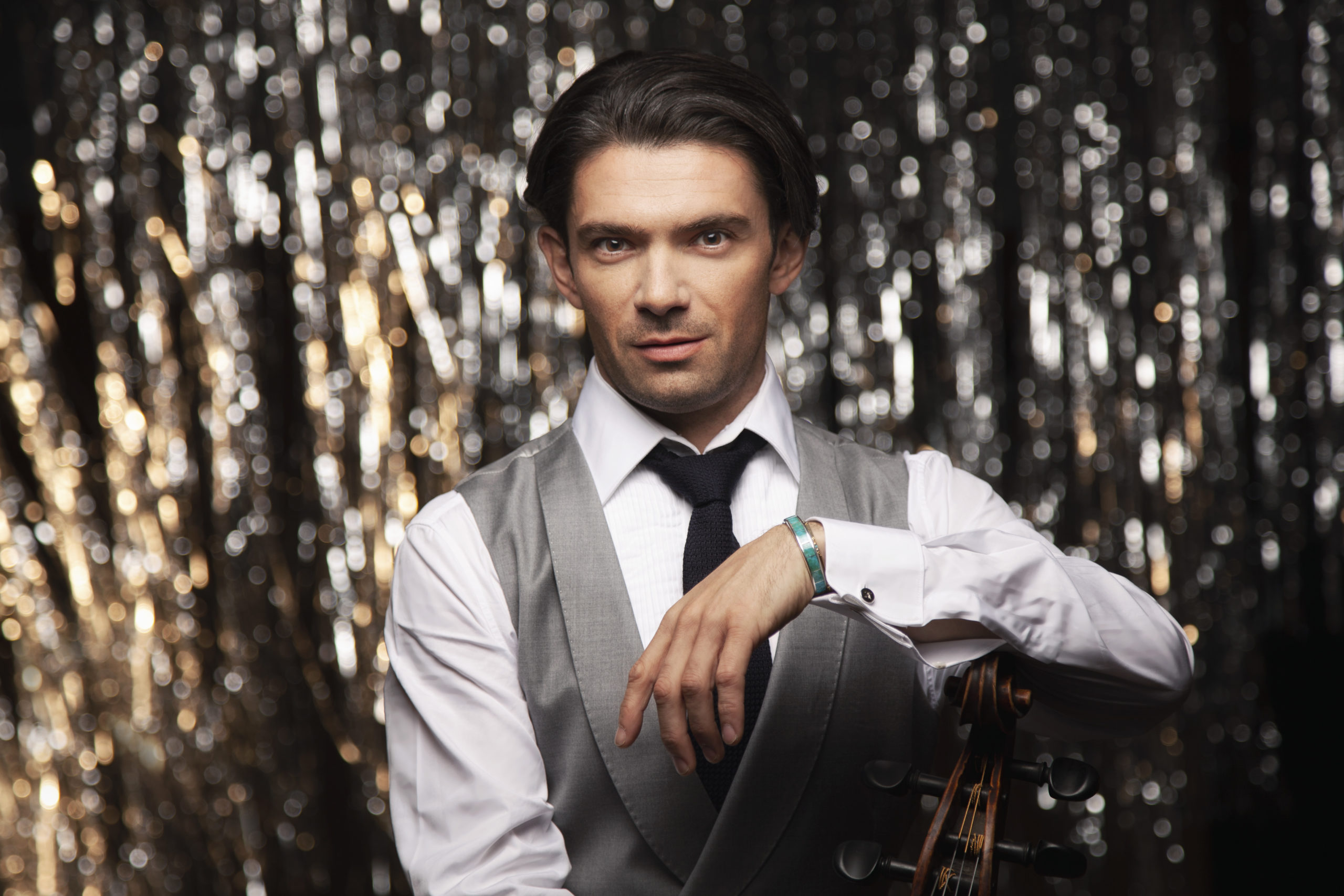
Photo: Michael Sharkey © Parlophone Records Ltd.
Capuçon has already recorded the work of a variety of composers, but, like any artist worth his or her salt, has a voracious artistic zeal for further exploration and collaboration. Learning the cello in his native France as a child, Capuçon went on to study in Paris and Vienna before becoming a member of both the Gustav Mahler Jugendorchester (GMJO) and the European Community Youth Orchestra (now the European Union Youth Orchestra, or EUYO), playing under conductors Pierre Boulez and Claudio Abbado. In 2001, he was named New Talent of the Year by Victoires de la Musique (the French equivalent of a Grammy Award), and has gone on to garner a myriad of rave reviews and give stellar performances with numerous prestigious orchestras, including the Berlin Philharmonic, the London Symphony, Staatskapelle Dresden, the Royal Concertgebouw, the New York Philharmonic, and the Orchester National de France, among others. He tours regularly with his former band, the Gustav Mahler Jugendorchester (his performance of Shostakovich’s Concerto No.1 for Cello and Orchestra in E-flat major, op.107 in Dresden in 2018 was so very affecting) and he sits happily in with the orchestra’s cello section in the second half of concerts as part of their performances. (He doesn’t just do that with the GMJO, either.) This past summer, Capuçon gave a delightfully lyrical reading of “Song To The Moon” (from Dvořák,’s opera Rusalka) at the 2019 Bastille Day celebrations, which featured conductor Alain Altinoglu and soprano Chen Reiss, among many greats.
As well as working with noted conductors (Yannick Nézet-Séguin, Gustavo Dudamel, and Paavo Järvi among them), Capuçon enjoys rich collaborations with a range of artists, including pianists Danil Trifonov and Jean-Yves Thibaudet, violinists Leonidas Kavakos and Lisa Batiashvili, and composers Lera Auerbach and Krzysztof Penderecki, to name just a few. He’s also performed and recorded with brother Renaud Capuçon (violinist) and sister Aude Capuçon (pianist). Intuition (Warner Classics), released in 2018, is a work filled with personal memories and inspirations, and features short, encore-style pieces by Elgar, Tchaikovsky, Rachmaninoff, Fauré, Massenet, Saint-Saëns, Dvořák, Piazzolla, Italian cellist Giovanni Sollima and pianist and longtime friend Jérôme Ducros (who also performs on the album). The album is part of a vast discography comprised of both orchestral and chamber works, all filled with a palpable intensity of approach which is given richly dramatic expression in a live setting.
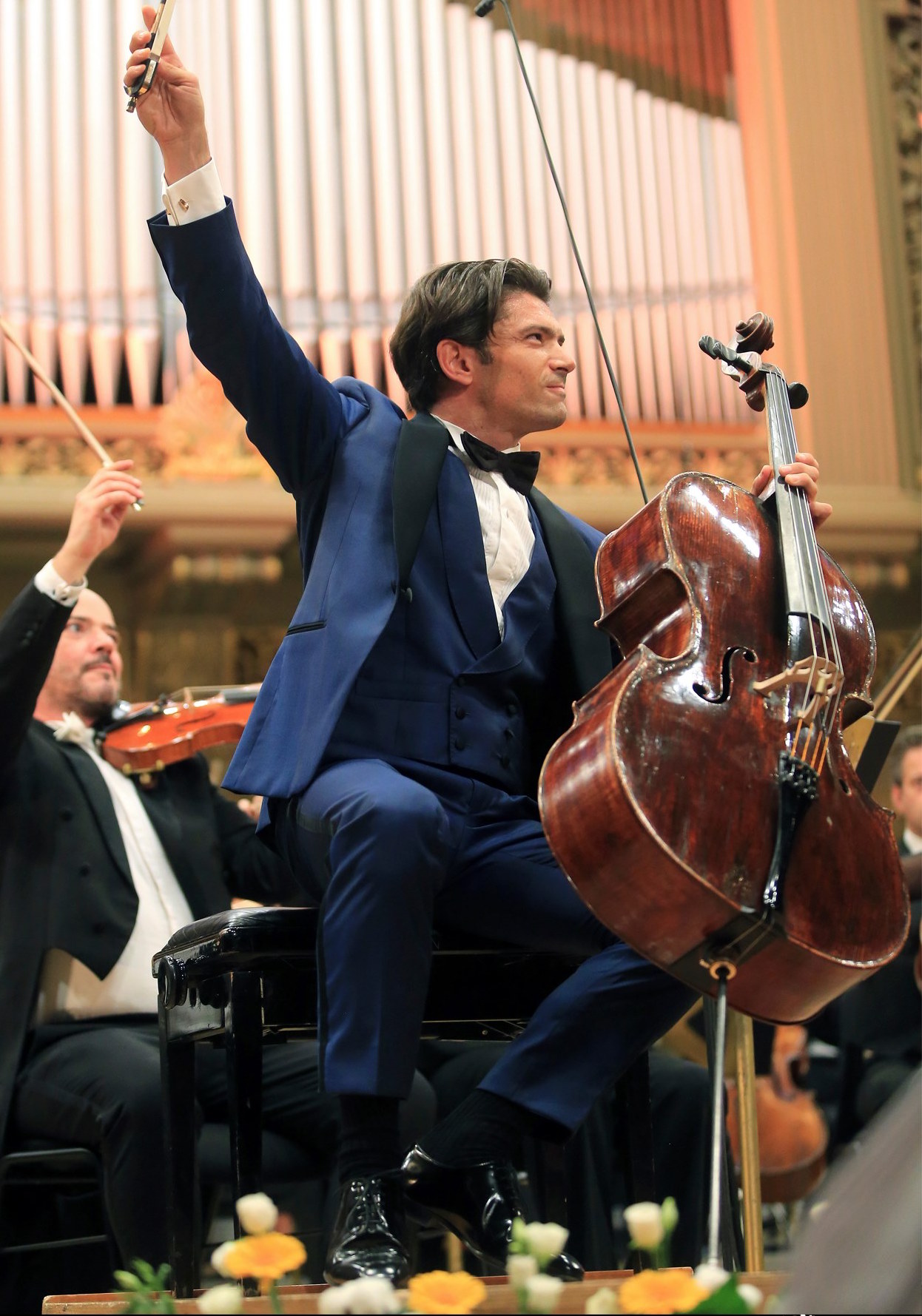
At the 2019 Enescu Festival. Photo: Catalina Filip
Capuçon drew widespread attention earlier this year when he gave an impromptu performance on a kerb near the smouldering remains of Notre Dame Cathedral; days later he was part of a benefit concert in aid of the building’s reconstruction, saying at the time that through his cello he expresses “what I can not always say with words. […] The music allows me to translate the sadness.” This past autumn, he was in Bucharest, performing with the Orchestre Philharmonique Monte Carlo at the Enescu Festival in Bucharest, his laser-sharp focus and keen passion for the musical moment unwavering amidst the numerous television cameras and warm lights beaming his performance live across the country. When I interviewed him in 2018, he spoke of the importance of transcending perfectionist tendencies:
… there is no one way to play something. It’s not only about technique. Technical things are there to serve the music, so you have to find the mixture, the good balance between extreme precision of course, and … leaving a huge space for that intuition, that inspiration, and that creativity. You really have to let go in another way.
The “huge space” that combines intuition, inspiration, and creativity has found beautiful expression his partnership with Yuja Wang. It’s one which, as you’ll read, has added an immense richness to both their creative lives, and, I think it’s fair to say, that of the audiences blessed to see and hear them live. They do go “another way” on Chopin-Franck, and what’s so magical is just how much they allow their listeners to join them on that journey.
What is your first memory of Yuja?
What I remember is that of course I was totally amazed straight away by her being such an amazing musician. This I found out very fast, because we started to play and immediately, at the first reading, there was something very natural about it – breathing together. Then we started to work and it was just going so fast, we were just… it’s like you can oversee what’s going to happen in the future. I could picture already that we would make a long journey together with the music and I was absolutely so excited. Within the first minutes I could feel she was an amazing musician and a musical partner for many years – which she is.
That chemistry is very noticeable.
It’s true, it’s something very special and very strong, powerful and emotional. There is so much energy. It’s like feeling the really all the different elements – the ground, the fire, the air, the water – it’s something really incredible between us two, always circulating. I think it’s getting, every time, stronger and stronger, which is amazing. Since the first time, yes, it was there, but in our last tour, every concert, it’s getting stronger. It comes with trust, like in any relationship. You can feel the base of the relationship, but there is something which is allowed to grow when you feel safe. Something also grows when you feel you can experiment together, which is exactly what we’re doing: we’re trying colors and different tempi. When you trust someone onstage you can go so far. You can try incredible things and you’ll know the other will react and sometimes surprise you, and sometimes shock you with something different – it’s really extraordinary, because that’s what music is about, it’s about communication and sharing – of course with the audience, but also onstage. When you have this way of communicating together the purpose is always to go further, beyond, and yet closer to the feelings of the composer. That’s the thing – it’s not about us, it’s about the composer – but when you know you can trust each other, then you can do incredible things. I can’t wait for this next tour in January, because I think it will be very strong.
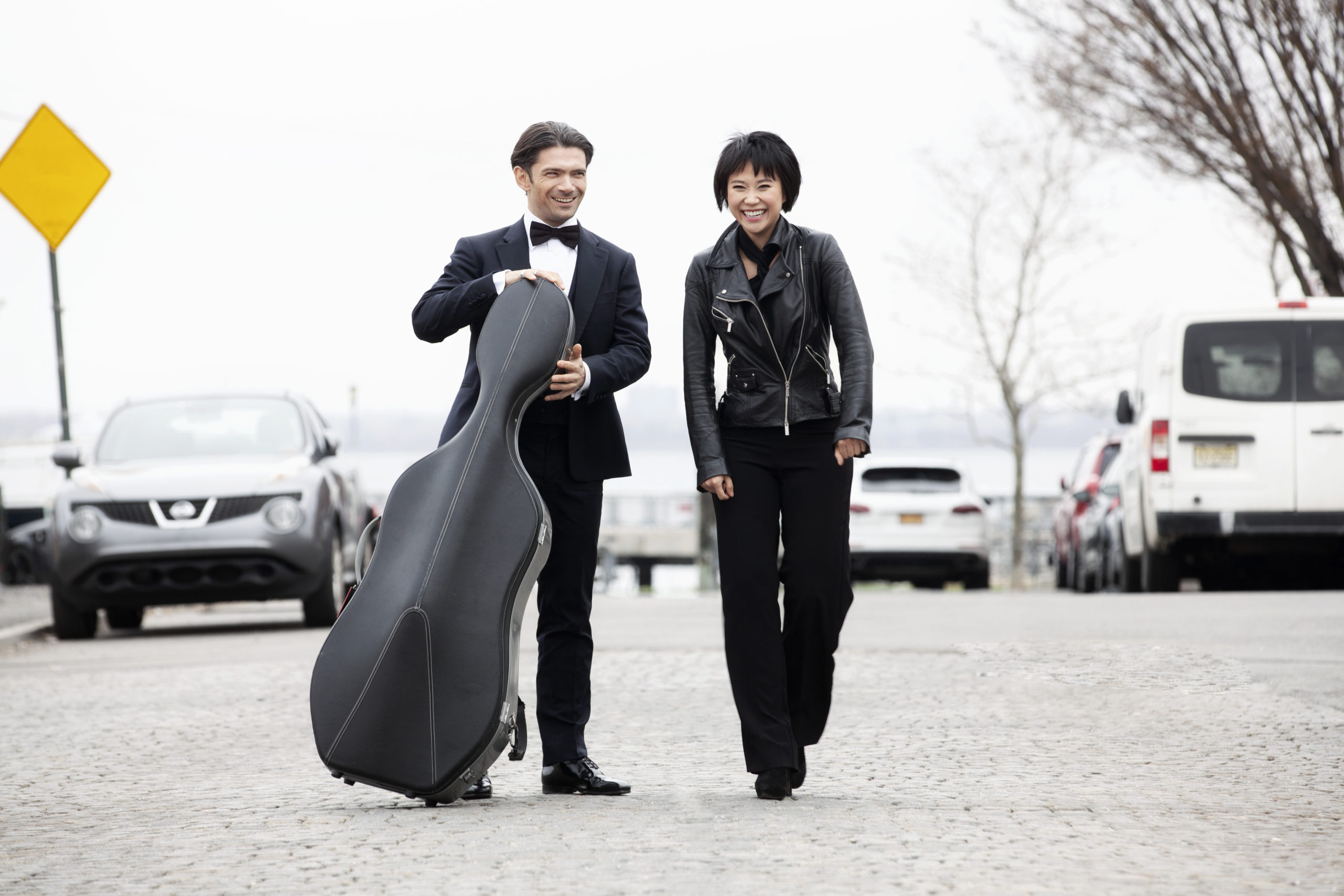
Photo: Michael Sharkey © Parlophone Records Ltd.
How did you decide on the repertoire for this tour and album? Why Chopin and Franck?
Different things — there’s repertoire that we have already done separately, and of course I have done some recordings of things with piano, but some I haven’t done, including the Chopin and the Franck. It is also something I wanted to do with Yuja. The Chopin – I was talking about this piece with Martha Argerich a few weeks ago! – is an extremely difficult piece. Pianists feel very close to Chopin of course, not like us cellists, but musically speaking it is a very difficult piece, to make it sound really as easy as we want to be listening to it. I don’t know if that’s clear enough..
It’s deceptively simple.
Yes, and it’s one I’ve not played a lot. I only played it a few times before with Yuja, which I also love, because this is something we worked on together, so we’re going down this road together, and we’re just at the beginning of the road, of course. As to the Franck, I played it a few times when I was much younger, in my twenties, and I’ve not played it in a while. This is a much more famous piece, it’s one almost everybody knows. We always think cellists are stealing this piece from violinists, but there is this story cellists like to say – that the first two movements were written for the cello, and the two last ones for the violin. Of course the piece sounds different on the violin than the cello; the question is not to copy or to make it sound like the violin because it’s two different instruments, it’s a different energy. The story with (violinist Eugène) Ysaÿe goes that when he got into Franck’s apartment and he saw this manuscript on the table, and read those first two movements, he said, “Wow, how great!” – and Franck was writing a cello sonata. But Ysaÿe asked for a violin sonata, and Franck then used those first two movements to make a violin sonata…
There’s a lot of speculation that it was originally written for cello.
Yes! And I haven’t played it a lot in the past few years; it requires a very orchestral approach in the way of playing and developing it, and think Yuja, with her sounds and her expression and her depth, does it incredibly – the way she did the colors in the first movement of that performance (at Koerner Hall) was unbelievable!
I think it’s such an incredible program, but I’ve seen a ridiculous comments online about how the pieces don’t belong together, and “I don’t understand why there’s a Piazzolla at the end” – well, that Piazzolla was the encore and we just wanted to include it on the recording as a bonus for the people! Honestly, some people write such stupid things! Anyway, to come back to this choice of repertoire, I think the Chopin and Franck work well together; they are nice to place as mirrors for one another. The Chopin is not an unknown piece but it’s not often played, and it’s great to put with the Franck, which is of course a very famous work. And the Polonaise is a little jewel, with all these Polish folkloric dances and this beautiful introduction. It is something so typical of Chopin and in there we can find all those pianistic things – this piece is more pianistic of course, in a way – and musically speaking, is much easier to read into than the Cello Sonata.
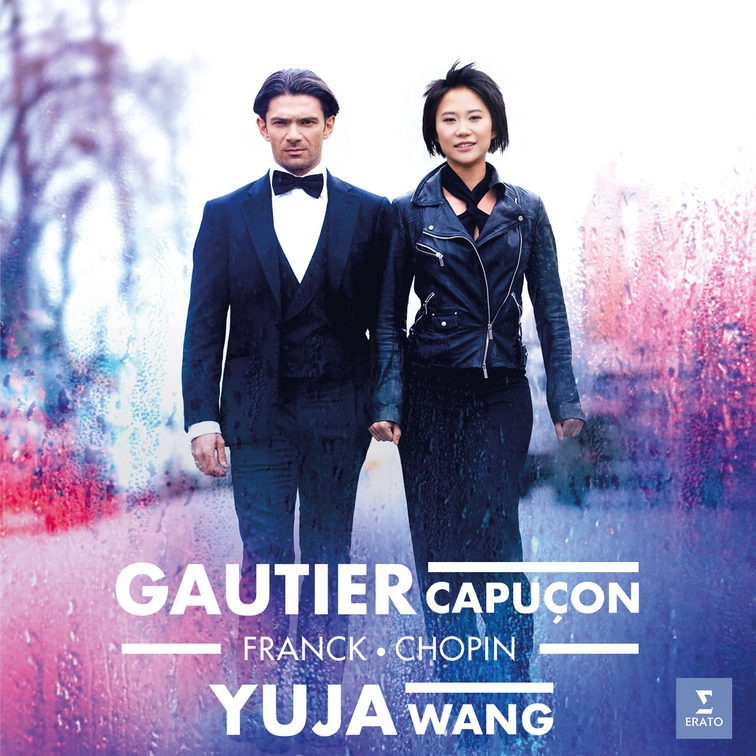
Warner Classics
It’s funny you say “pianistic” – that is the precise word I would use! It seems like a healthy stretch creatively…
Yes, it’s a real dialogue there. Actually, I had been playing also more cellistic versions, more virtuoso versions, on the cello. Some cellists arranged it and basically stole a bit of that to play; I did those versions when I was younger. When you’re younger, you know, you want to prove you can play fast! I came back to this first version, however, because you know, I think it’s meant to be the piano and the cello singing. So that’s why this original version is the one we wanted to do with Yuja.
How did it happen to get recorded at Koerner Hall?
In life I really believe in opportunities. You can say, “Okay, I want to record in that hall and let’s make these dates around it.” But in this case we arranged ourselves according to the touring schedule, and we had both been playing in this beautiful Koerner Hall ourselves in past years. It was the end of our tour this year after something like ten concerts, with Carnegie in the middle, and it was just perfect for the timing. (Koerner) a fantastic hall with great acoustics, not too small, not too big, great sound quality and it was open at the end of the tour. So it was just a dream for us. It couldn’t have been better – absolutely perfect timing. And we already have many other plans for the next program!

3 Pingbacks